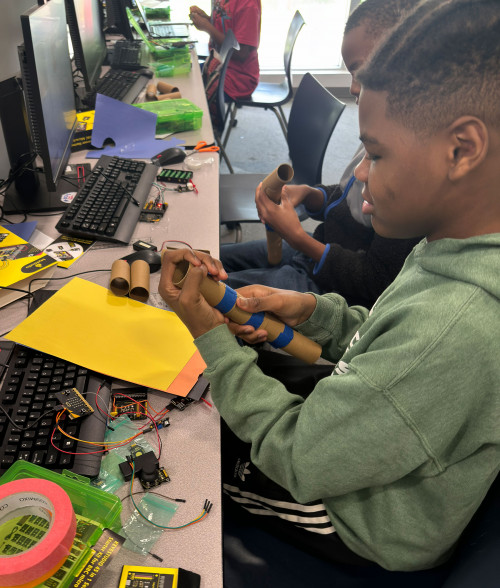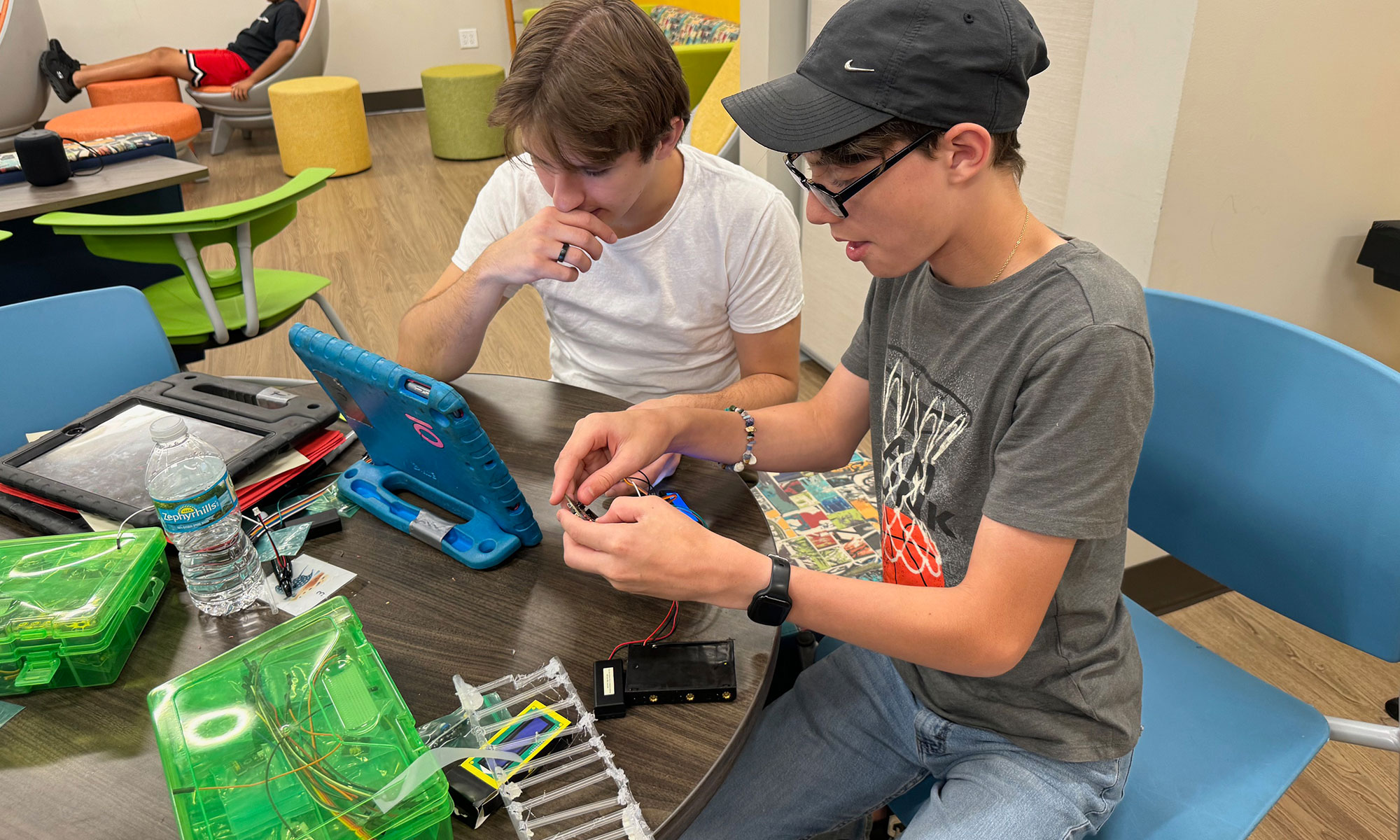This summer, more than 20 University of Florida student mentors will fan out across 16 Florida counties to help lead 39 engineering summer camps for nearly 400 students.
As part of UF Engineering’s 2025 Engaged Quality Instruction Through Professional Development, or EQuIPD camps, high school and middle school students will delve into design challenges that incorporate artificial intelligence, programming and machine learning with engineering design thinking.
Alongside UF student mentors, middle school campers will learn about electrical power in hands-on lessons about smart microgrids. In EQuIPD’s Rural Scholars Summer Program, students will explore AI in agriculture, visit smart farms and build self-driving tractors.
High school students will dig into machine learning through music and sports, as well as analyze AI data to develop hurricane forecast models.
Starting the first week of June, the free camps are designed to inspire early generations of engineers for a workforce already short on qualified professionals, especially in AI. The program has grown considerably since 2022’s inaugural Goldberg Gator Engineering Explorers camp, started with a $200,000 foundational donation from UF alumnus and tech executive Arnold Goldberg.

That year, more than 110 students in six counties attended eight camp sessions led by local teachers and UF student mentors. In 2023, attendance swelled to 319 middle and high school students in eight counties with 22 camps, 20 local teachers and 20 UF student mentors.
Then, in 2024, organizers expanded the Goldberg program and added three more camp programs: MathWorks High School AI, Powering the Community Energy Explorers and the Rural Scholars Program. In total, those camps served 370 students in 13 counties with 20 local teachers and 22 UF engineering student mentors.
This summer, there will be EQuIPD camps in Alachua, Brevard, Calhoun, Charlotte, Gilchrist, Hernando, Leon, Marion, Miami-Dade, Nassau, Orange, Palm Beach/Martin, Pinellas, Putnam, Sarasota and Sumter counties. The camps will be led by 43 teachers from their respective districts who have been trained by UF engineering faculty. They will teach alongside 20 student mentors throughout the state.
Thus, EQuIPD will provide free hands-on, cutting-edge engineering camps — in one- or two-week sessions — from the western Panhandle to South Florida led by one of the top university engineering programs in the country.
“As the premier land-grant Institution in the state, UF has a mission to serve the populace of Florida, and these camps serve our mission in supporting young students, teachers and districts,” noted Nancy Ruzycki, Ph.D., a master lecturer in the Department of Materials Science & Engineering (MSE) and principal investigator on the EQuIPD grant.
There will be six types of EQuIPD camps this year. The Goldberg Gator Engineering Explorers programs, for example, will continue to stress the basics of AI and machine learning. Students will solve real-world problems with computational thinking practices.
‘Who doesn’t want to be a Gator engineer, right?’
Nancy Ruzycki, Ph.D., principal investigator, UF Engaging Quality Instruction through Professional Development EQuIPD grant
“During the camps, they work with a microcontroller called a micro:bit. It’s tiny but mighty,” said Krista Chisholm, Ph.D., a research assistant scientist with MSE who works with the camps. “It is easy to program and has a lot of built-in features like a programmable LED display, buttons and sensors to measure light, acceleration and sound. They are great tools for beginners to start with and can grow with students as they gain programming skills.”
Among the activities in EQuIPD camps, students make micro:bit pets programmed to be interactive. These microcontrollers can be used in engineering design projects, like programming a stop light to change status if an emergency vehicle nears or creating a gesture-recognition program through machine learning that knows what letter you are drawing in space.
In 2024, UF added more EQuIPD camps, including MathWorks for high school students, AI lessons and a Powering the Community Energy Explorers program through gifts from industry and foundational donors. In addition to the donors for the programs, the districts are equal partners, providing infrastructure support and, in some cases, purchasing technology and paying for teachers to facilitate the camp.
“We focus on a sustainability model,” Ruzycki, said. “And that’s why we like the districts to provide the teachers because then that teacher is trained and remains in that district. Our goal is that within three years, districts are able to build out their own ecosystem of donors and infrastructure to support their own district camps independently.”
It is a model that works well for Florida school districts.
“Through the EQuIPD, Goldberg Gators Engineering Explorers Summer Program, our students explored real-world applications of engineering design and computer science in a
way that was both challenging and inspiring. The experience was not only enriching for our learners but also energizing for me as an educator,” noted teacher Rene Barge of the Miami-Dade County Public Schools.
Ruzycki said the growth of the camps speaks to a need for high-quality — and free — hands-on technology-focused camps in the state.
“And then there is the UF brand, which is extremely important in why people want this,” she said. “Who doesn’t want to be a Gator engineer, right?”
Donors will sponsor camps within certain districts to make them available to areas served through their foundational work.
“Districts are very interested in trying to support students in the summer through high-quality programs,” Ruzycki added, “but many vendors are so expensive, districts can’t afford it. We provide everything basically for free in partnership with the district.”
For more information on the camps, visit the EQuIPD site.

